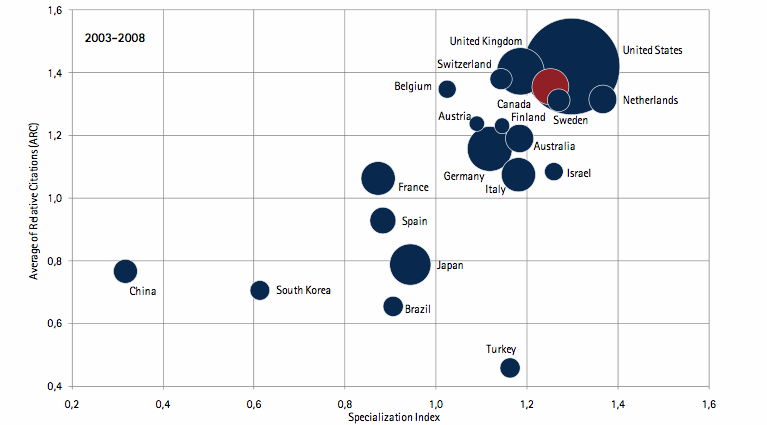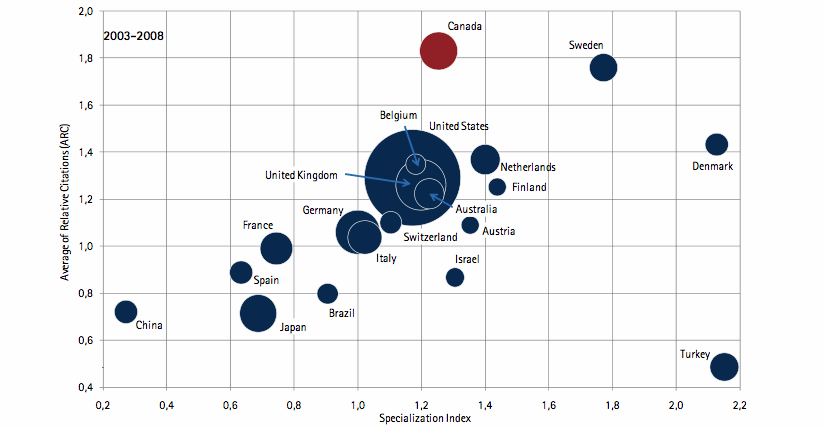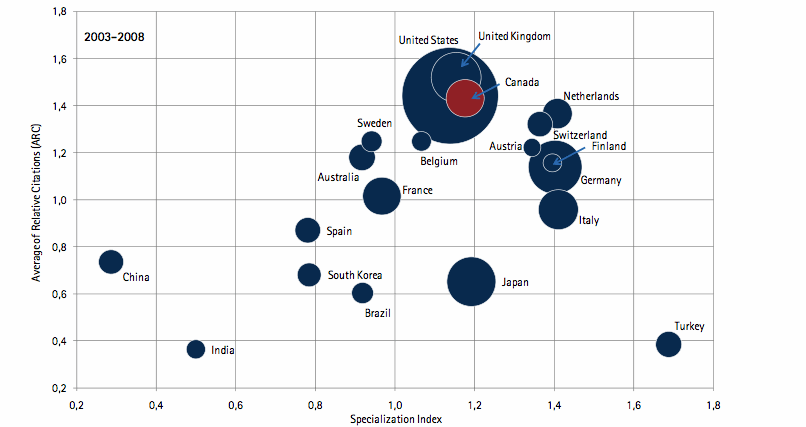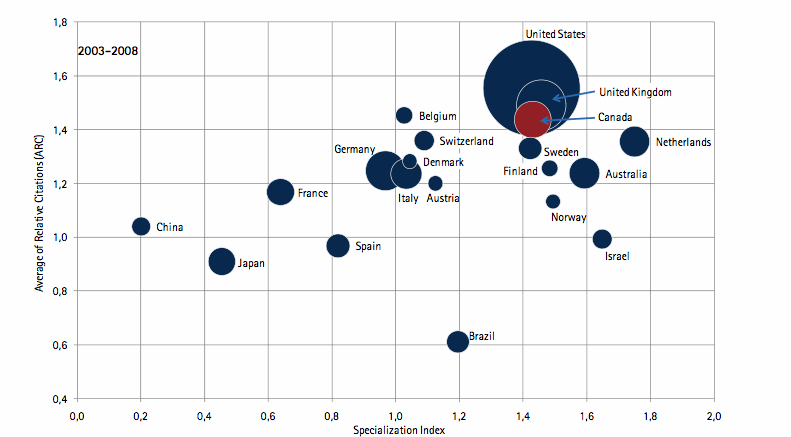Canadian neuroscientists are leaders in their field. A recent bibliometric study by the “Observatoire des sciences et des technologies” shows that Canadians rank amongst the most productive in the world in the field of neuroscience, but also, and perhaps more importantly, that their production is of very high quality. This independent study, commissioned by the Canadian Institutes of Health Research (CIHR)’s Institute of Neurosciences, Mental Health and Addiction (INMHA) quantifies the amount and quality of research published in neuroscience in different countries around the world.
Productivity of Canadian Neuroscientists
Productivity can be measured in terms of number of articles published in scientific journals whose value is recognized by peers. Canada ranks fifth in the world for its publications in neuroscience, as shown in the table below.
Articles published in Neuroscience in 1997-2002 and 2003-2008, in the ten most active countries in the world in this area (data from Table 4 of the report “Bibliometric Analysis of INMHA-related Research, 1997-2008”)
|
Ranking |
Country |
Number of articles 1997-2002 |
Number of articles 2003-2008 |
|
1 |
USA |
173 085 |
207 593 |
|
2 |
UK |
41 782 |
50 218 |
|
3 |
Germany |
36 936 |
45 141 |
|
4 |
Japan |
37 962 |
38 191 |
|
5 |
Canada |
22 485 |
29 287 |
|
6 |
Italy |
20 102 |
26 240 |
|
7 |
France |
23 051 |
25 335 |
|
8 |
Australia |
12 332 |
17 874 |
|
9 |
Netherlands |
11 992 |
17 457 |
|
10 |
Spain |
11 552 |
15 176 |
With a 30% increase in publications in Neuroscience between 1997-2002 and 2003-2008, Canada has risen from sixth to fifth place in the world in terms of volume of production in neuroscience, surpassing France.
The research publications of Canadian Neuroscientists are of very high quality. In the bibliometric report, the quality of research publications was illustrated using two criteria: The Average Relative Citation and the Specialization Index. The average relative citation is a measure of the impact of the research as it reflects how often publications are cited by other researchers, or peers. Using this criteria, Canadian neuroscience research publications ranked in the top 4 in the world(see figure 6 from the report, copied below, y-axis; the size of the circle reflects the volume of publications in each country). Specialization index (x-axis of figure 6) is a measure of the density of publications from each country in a specific area (general neuroscience, in figure 6). A value above 1 means a group of researchers is specialized compared to the world average. Canada’s specialization index in neuroscience has increased in the last 5 years, to reach a current value of 1.25.
GENERAL NEUROSCIENCE

In certain neuroscience specialties, the quality of Canadian research distinguishes itself even further. Canadian neuroscientists rank first in the world for average relative citation in the area of Pain Research(figure 18 from the report, reproduced below)
PAIN

As can be seen in the two following figures, Canada ranks second in Neuroimaging (figure 8 from the report) and third in the area of Mental Health (Figure 12), in terms of Average Relative Citations.
NEUROIMAGING

MENTAL HEALTH

This report demonstrates that Canadian neuroscientist are very productive, and their production is of high quality. These results are even more remarkable when one considers that the Organization for Economic Cooperation and Development (OECD – country statistics determined that among the 20 most active countries in neuroscience, Canada ranks only 11th in terms of spending on research and development (measured as a percentage of gross domestic product), and ninth in terms of number of researchers in the workforce.
Complete reference: Vincent Larivière, Benoit Macaluso, Jean-Pierre Robitaille, Pascal Lemelin, Philippe Mirabel, Eric Marcotte, Nathalie Gendron (2010) “Bibliometric Analysis of INMHA-related Research, 1997-2008” Prepared for INMHA-CIHR. Available at:
https://can-acn.org/documents/INHMA_Bibliometric_Report_e.pdf
Acknowledgements: We wish to thank Eric Marcotte and Nathalie Gendron from INMHA for helpful discussions about this report.





